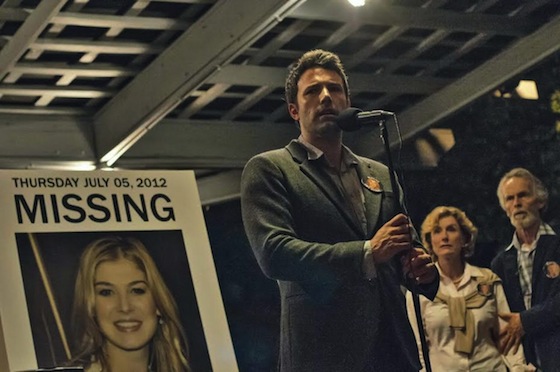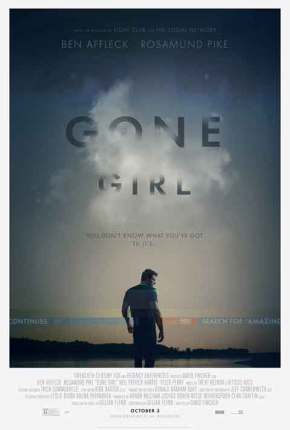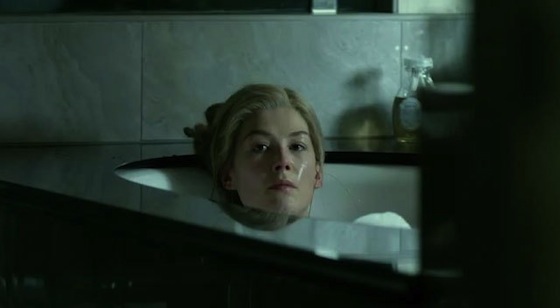This Gone Girl movie review appears in the Lawrence Journal-World.
Buried somewhere beneath the button-pushing gender politics and all-too-convenient plot twists in Gone Girl, there are some mildly interesting points being made about modern marriage. But after two and a half hours of soapy ridiculousness that wouldn’t be out of place on TV’s The Bold and the Beautiful, the movie just seems like cruel and unusual punishment.
The film’s title not only refers to the fact that Amy Dunne (Rosamund Pike) has literally gone missing at the beginning of this tonally uneven thriller but also that she checked out of her marriage years earlier. Her emotionally stunted husband, Nick (Ben Affleck), has done the same.
Flashbacks of their sexually charged courtship and early heyday are presented along with the present-day story, where Nick is under heavy suspicion for her murder. He’s also a philandering jerk who’s having a hard time feeling too bad about her disappearance.
 Director David Fincher’s masterstroke was casting Affleck, who has his typical hollow look behind the eyes that fits the part perfectly. But when the circumstances change — and they do, wildly so — Affleck doesn’t have the range it takes to be convincing and drive home some of the story’s outrageous turns.
Director David Fincher’s masterstroke was casting Affleck, who has his typical hollow look behind the eyes that fits the part perfectly. But when the circumstances change — and they do, wildly so — Affleck doesn’t have the range it takes to be convincing and drive home some of the story’s outrageous turns.
Gone Girl is based on the best-selling novel by former Kansas University student and Kansas City native Gillian Flynn, who also single-handedly adapted the screenplay. Her sexually frank and often mean-spirited outlook on modern relationships is fresh, but too often Amy (in flashbacks) and Nick spout dialogue and narration that seems more agenda-based than character-based.
Fincher (Zodiac, Seven) is reliably dark, infusing the first half of Gone Girl with the appropriate amount of dread and red-herring doubt. Once the film shifts gears into a scattershot serial-drama-cum-media satire, he’s less reliable, however, and loses control.
The final act drags and drags while it struggles to refocus, and the characters become disappointing clichés. Pike is buried under the weight of the script’s wannabe high-minded trash, and Affleck can’t commit to Nick’s unlikely turnaround.
Fincher collaborators Trent Reznor and Atticus Ross also have a couple “look at me” menacing moments in the score, but their contribution, too, is hampered by wildly differing tones.
Gone Girl wants to be lots of different kinds of movies and ultimately fails at being very good at any of them. There are wiser films about marriages that fall apart and more savvy eviscerations of the snap-judgment media culture.
Once one of the main characters is shown to be a psychopath, it may make the preposterous reveal a little easier to swallow, but it cheapens any deeper discussion of the other issues. One day we’ll look back and chuckle at how seriously people took Gone Girl the same way we do now at Fatal Attraction.










{ 14 comments }
Agenda based? What agenda might that be?
I think the story had a very clear agenda at first, pointing out the ways that men subjugate women. There’s the husband version, the former lover version, and of course what her parents do to her. Had it stayed remotely within the realm of believability, the movie could have explored the subtleties of these kinds of relationships and moved beyond cheap button-pushing. Instead it turned into a toothless satire that couldn’t keep even footing. I mean, Nancy Grace? Really? How easy a target is that?
I had fun with it. It was creepy enough to entertain and was beautifully filmed. The acting was rather good. It’s interesting that several reviewers drew parallels to Fatal Attraction, where I thought this movie was a good version “The War of the Roses:” more subtle, more mental, yet even more vicious at the same time.
Interesting comparison, but I wouldn’t use the word “subtle” to describe anything in this movie, Doug.
Thank you, Eric. I totally agree. My husband, daughter and I saw “Gone Girl” last night and were underwhelmed. The script, particularly at the beginning, is sophomoric and embarrassing — with such gems as “world-class vagina” tossed in our face. C’mon, Ms. Flynn. Really?
The fact that this film is getting as much play on the talk-show route as “Fatal Attraction” did only makes me think of the dirth of quality TV, and that the Super-smart, Sexy, Ivy-league, Sociopathic Wife is merely the latest flavor of the month — probably to keep us, the 99%, from looking at the real sociopaths who run things.
That’s the part that’s supposed to get a rise out of us. If the whole film stayed with a consistent button-pushing tone like that, maybe it would have been more fun and gone done easier. Instead, it’s this dogged self-seriousness in the face of complete insanity that keeps me from taking it seriously, kind of like “300.” But that’s another discussion!
sorry, should be: DEARTH of quality TV
Dearth of quality TV eh? Have you seen Rectify, The Bridge, Transparent, Halt and Catch Fire, True Detective, Utopia, The Honorable Woman… the list of great TV from this year is long.
I agree that Gone Girl was a waste of space. Movies are dead. Auteur showrunner critically acclaimed cable dramas, are where its at. A whole well drawn universe, lasting for 12-13 hours a season. Movies can’t compete with the scope for realism offered by the golden age of cable dramas.
Thanks for helping me get rid of my irritation about the ending of “Gone Girl”. I had not read the book, but USA Today had promised lots of positives and no negatives for the film; so I was blindsided by the 180 degree turn of character by Ben Affleck’s character Nick. He’s married to a sociopath, for heaven’s sake! He knows that! His sister knows that! Is he also so sick that he believes his wife will not kill her child (where’d that kid come from, anyway? Did she hoard his old sperm bank stuff?) just to get back at her husband? You gotta feel sorry for his emasculated twin sister at this point.
Nick must have a death wish.
Okay, so the movie had some impact on me. and I agree with your take on “War of the Roses”, which pales in comparison. I was coming off a bad marriage and I actually laughed during “Roses”, which annoyed people around me, who were taking it all very seriously,
But as a retired mental health counselor I wonder if young people are taking this movie’s message to heart: that no matter what has happened, stay with your crazy spouse. I sure hope not.
Barb, I really hope that’s not the message of the film, but it’s hard to tell because it’s so all over the place. Nick is obviously trapped in a cycle of abuse, but film (and his acting) weren’t good enough to sell the dumb character turns, so the whole thing just comes across as utterly unconvincing and false.
I thought it was a compelling preposterous story right up until Pike found herself in the arms of Neil Patrick Harris. I grinned evilly while leaning over to my wife to whisper “I hope the twist is that Harris kills her and Affleck ultimately takes the blame”. Alas that was not to be the case. As Affleck so aloofly mentions at the hospital “she was tied up for weeks, how did she get a hold of a box cutter”? Maybe he should have been put in charge of his own investigation? As I stated, the movie lost my interest in the final 30-40 min of this 2.5 hour trek which is a time frame usually spent to explain stories like Lord of the Rings and the Harry Potters of the world. The last third of the movie had too many holes for me to continue to suspend disbelief. It had the beginnings of a master piece and like most Hollywood movies ended in a train wreck of tidy loose ends.
“Maybe he should have been put in charge of his own investigation?” Ha! Love it, Bret. I agree too about the first half of the film, which maintained Fincher’s penchant for dread. Once the twist happened, it was already pushing the boundaries of credulity. When Harris’ part of the story became the focus, it became this way over-the-top heightened “un-reality” that didn’t jive with the rest of the film.
Dialogue on flashback are fake on purpose. They speak like in a bad “classic ” hollywood” movie on purpose. It works as a clue to make the viewer to suspect about all the flashback thing and amy as a narrator. There are lot of visual cues from finch to show that also. Remember that Amy is trying to tell an story to the police. She wrote her journal entries as a novel. Is a very self conscious movie. Like the ones who Hitchcock made back then, One of the main theme of the movie is – not trust in what you see on the screen. If you look this movie trying to make sense of everything what happens on screen then you are watching the wrong movie because this film yells DON’T TRUST ME. The perfect example is the use of the same shot at beginning and end .Sorry for my english
I didn’t like it. Utterly unbelievable. Who put the diary in the furnace anyway? Ben Affleck? The movie just doesn’t work.
Comments on this entry are closed.